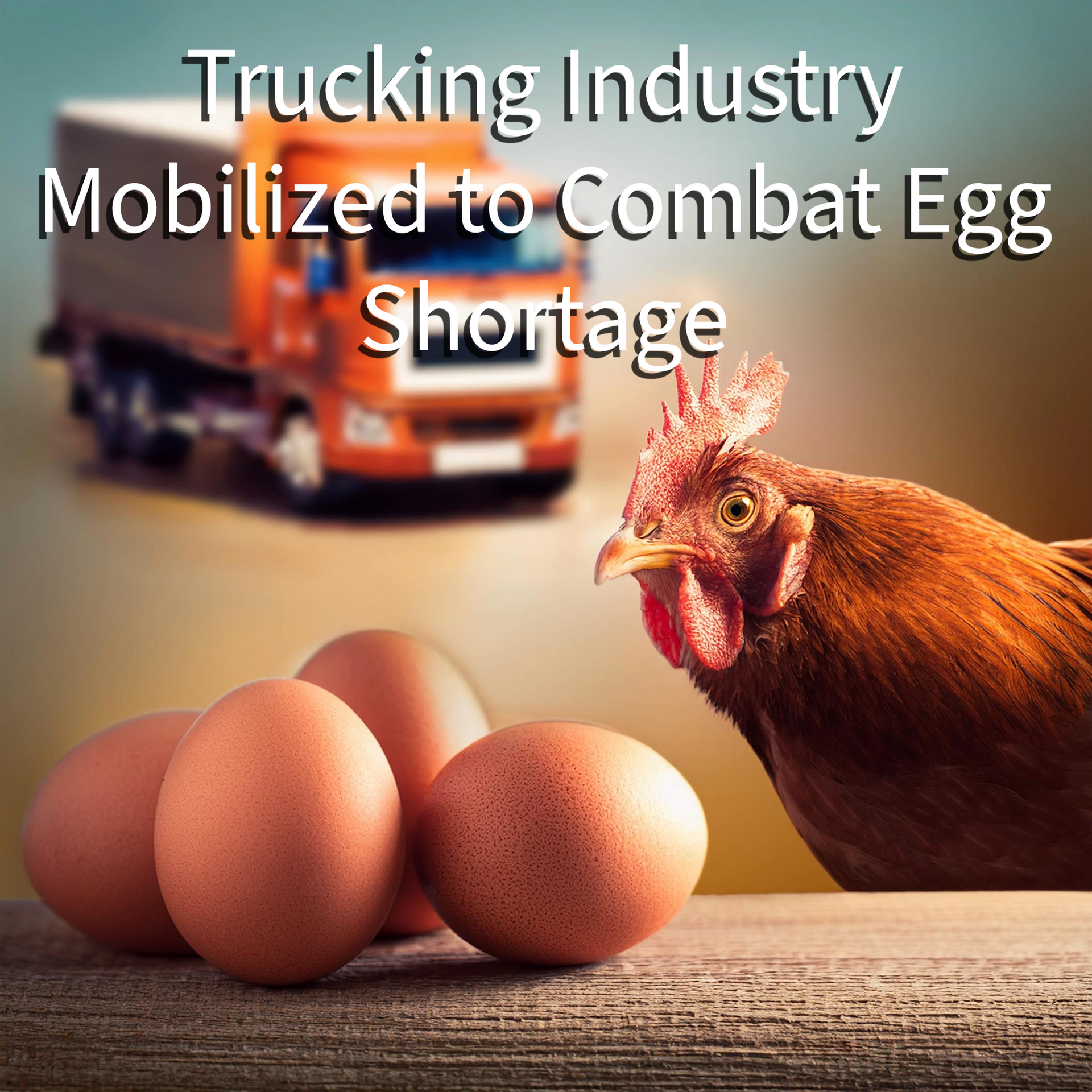Trucking Industry Mobilized to Combat Nationwide Egg Shortage
Share this Article:
Avian Flu Outbreak Affect on Eggs

The U.S. trucking industry is stepping up to address a growing national crisis: a severe egg shortage caused by the spread of highly pathogenic avian influenza (HPAI). In response, the Federal Motor Carrier Safety Administration (FMCSA) has issued an emergency declaration easing hours-of-service regulations for motor carriers transporting live chickens away from affected areas.
Emergency Measures for Truckers
The FMCSA’s emergency declaration grants exemptions from 49 CFR 395.3, the federal regulations governing daily and weekly drive-time limits for truck drivers. The goal is to accelerate the movement of live chickens out of HPAI-infected zones to mitigate the loss of egg-laying hens and restore the national egg supply.
“This declaration addresses the emergency conditions creating a need for immediate interstate transportation of live chickens from highly impacted areas,” the FMCSA stated.
California, Iowa, and Louisiana had already implemented 14-day emergency waivers in December to aid motor carriers in handling the crisis. However, as new outbreaks have emerged in Ohio and Pennsylvania, the FMCSA expanded its regulatory relief nationwide.
Egg Prices and Supply Chain Pressures
The impact of HPAI has been devastating. Since its first detection in U.S. poultry flocks in January 2022, millions of egg-laying chickens have died, causing severe supply shortages. The result: skyrocketing egg prices, with some areas seeing costs exceed $10 per dozen.
Retailers, including Trader Joe’s and Costco, have started rationing eggs, limiting the number of cartons customers can purchase per shopping trip. The U.S. Department of Agriculture (USDA) warns that further outbreaks in the eastern U.S. could worsen the supply chain crisis.
White House Response and Political Debate
At a White House press conference in January, Press Secretary Karoline Leavitt placed blame on the Biden administration for the egg shortage, highlighting ongoing political tensions surrounding food supply chain management. However, industry experts point to the avian flu as the primary cause of the crisis, not federal economic policies.
Conditions and Restrictions Under the Emergency Waiver
While the FMCSA has loosened regulations to aid emergency transportation efforts, the exemption comes with strict conditions to ensure safety:
- Pre-Approval Required: Motor carriers and drivers must secure all necessary permissions for transporting and delivering live chickens.
- Receiving Facility Agreement: Drivers must obtain a valid agreement from the receiving facility before transport begins.
- Driving Time Restrictions: Drivers cannot exceed 16 hours of driving in any 24-hour period and must stop all driving by midnight each day.
- Mandatory Rest Periods: Drivers must take a minimum six-hour break in a sleeper berth before resuming operations.
- Record-Keeping Requirements: Drivers must maintain paper records of duty status (RODS) and supporting documents for six months, making them available to FMCSA and law enforcement upon request.
- Compliance with Licensing and Safety Regulations: Drivers must hold a valid Commercial Driver’s License (CDL) and not be under any out-of-service order or suspension.
The waiver took effect immediately and will remain in place until midnight on March 10 unless conditions improve before then.
Implications for the Trucking Industry
For truck drivers and motor carriers, this emergency declaration means increased workloads and responsibilities. The demand for experienced CDL drivers willing to transport live poultry under these conditions is expected to rise significantly. Additionally, companies must ensure compliance with the waiver’s provisions while balancing efficiency and driver safety.
While the emergency waiver provides temporary relief, long-term solutions will be necessary to prevent future disruptions in the food supply chain. Industry leaders are calling for increased biosecurity measures, enhanced tracking of poultry diseases, and better coordination between farmers, trucking companies, and federal agencies.
Final Thoughts
As the avian flu crisis continues to impact the national food supply, the trucking industry plays a crucial role in mitigating its effects. The FMCSA’s emergency action underscores the importance of flexible, rapid-response measures in the face of agricultural and supply chain crises. However, with ongoing outbreaks and rising demand for eggs, the road to stabilization remains uncertain.
For truckers, the coming weeks will be challenging, but their role in keeping grocery store shelves stocked and supply chains moving has never been more critical.
Bloom Services
Here at Bloom Services, we are 100% OTR trucking. While you won’t find us on a virtual billboard in a simulator, we do offer newer trucks, and cover trailer and cargo liability. We do not pay based on mileage, rather we pay 80% gross load. This is beneficial for strong drivers with a decent work ethic, you will earn based on the actual load rather than mere miles. Our drivers average $3,000 plus a week take home pay after all expenses, like fuel, truck rent, etc. If you have Grit, and the endurance to consistently deliver loads and run for at least three weeks at a time, you can take home $150K a year. If you are interested, apply now.



